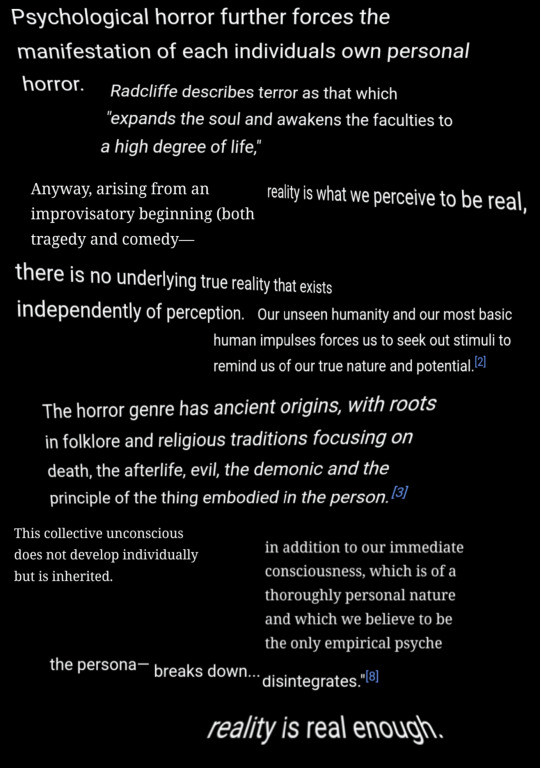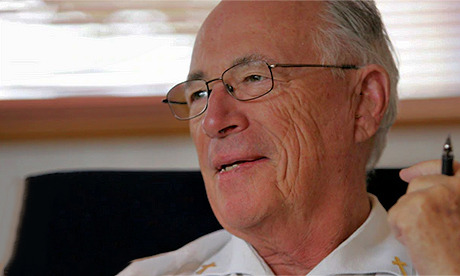#subjectivism
Quote
Ultimately, the subjectivist approach to morality collapses because it lacks an adequate metaphysical basis (a transcendent and morally perfect one, such as the God of the Bible).
Samples, Kenneth Richard. ‘Without a Doubt: Answering the 20 Toughest Faith Questions. p. 238
9 notes
·
View notes
Text
By: Mark Goldblatt
Published: Feb 7, 2023
Several years ago, in the pre-pandemic world of in-person meetings, a newly hired colleague at Fashion Institute of Technology proposed an LGBT-themed sociology course before the School of Liberal Arts. This is a necessary step in getting the course approved by the college-wide curriculum committee. It’s a time for constructive feedback and occasional tweaking before the final committee vote.
It was a good course. The proposal was clear and concise, indicating not only a command of the relevant literature but a sensitivity to students’ interests, expectations, and ability to handle the workload. But I noticed an apparently minor, easily correctable issue. Among the learning outcomes listed was a requirement that students develop a greater acceptance of LGBTQ+ perspectives and rights. That struck me as problematic. I happen to think that such acceptance is a good thing, but to stipulate it as a learning outcome raises a knotty question. If a student masters the course material, turns in the required work, and passes the exams, but doesn’t exhibit that acceptance, is he going to fail?
After expressing my general admiration for the course, I raised my misgiving in the following way (and this is nearly an exact quote): “We need to keep in mind that we’re a state university. Our mission is to pursue, ascertain, and disseminate objective truth, and to equip our students to do the same. Given that mission, I don’t think we can list a learning outcome that requires students’ assent on a matter of personal morality. The other learning outcomes are fine. You don’t need that one, so I’d just cut it.” My colleague was fresh out of graduate school and not yet tenured, which (theoretically) put her in a vulnerable position. Nevertheless, she became apoplectic; so angry, in fact, that she had difficulty getting out her first sentence. “I can’t believe people still think that way!” she spluttered. “Queer Theory has deconstructed objectivity!”
Her words hung in the air as I glanced around the room. Not a single faculty member, not even those in math or sciences, seemed fazed by her categorical statement. Since I was a tenured professor, I was reluctant to debate an untenured colleague during a school meeting. So, I let the matter drop. The course was approved without revision by the School of Liberal Arts, and went on to gain approval by the curriculum committee. And that is how my college got into the business of winning converts.
That moment haunts me as I begin my final semester before retirement—not only because faculty on the state payroll have deliberately crossed the critical line from pursuing the truth to professing The Way, but also because the Enlightenment sensibility that finds such mission creep objectionable seems to be passing from the scene. The “deconstructive turn”—as the critic Christopher Norris once called it—is nothing more than a verbal sleight-of-hand. It invites us to tease out secondary and tertiary senses of words to show how a text contradicts what it seems to be saying, free-associate our way to philosophical banalities or outright non-sequiturs, and finally glaze the mishmash with a layer of impenetrable jargon. If a reader is foolish enough to attempt to make sense of what is being said, he’ll get bogged down before he can figure out nothing is being said at all.
When Jacques Derrida, the renowned “father of deconstruction,” was awarded an honorary degree by Cambridge University in 1992, 20 of the world’s preeminent philosophers—including W.V. Quine and Ruth Barcan Marcus—signed a letter of protest, in which they argued:
M. Derrida describes himself as a philosopher, and his writings do indeed bear some marks of writings in that discipline. … In the eyes of philosophers, and certainly those working in leading departments of philosophy throughout the world, M. Derrida’s work does not meet accepted standards of clarity and rigor. … M. Derrida seems to us to have come close to making a career out of what we regard as translating into the academic sphere tricks and gimmicks similar to those of the Dadaists. … Many French philosophers see in M. Derrida only cause for embarrassment, his antics having contributed significantly to the widespread impression that contemporary French philosophy is little more than an object of ridicule.
The claim that Queer Theory has “deconstructed objectivity” means only that a certain number of academic performance artists have doodled with a cluster of words related to the concept of objectivity in order to gain university employment, win friends, and influence a distressingly large number of gullible fans. But no epistemological breakthrough has come of their efforts: if it had, it would be self-refuting since it would consist of an objective truth about the impossibility of objectivity. (At a lecture I attended 40 years ago, a debonair British postmodernist stated that Derrida had shown us how it was possible to formulate a consistent argument with a contradiction in it. When I inquired how, in that case, we could recognize an inconsistent argument, the question was met with actual hisses from his acolytes. I’m still waiting for an answer.)
Objectively true statements are still made on a regular basis. The statement “Objectively true statements are still made on a regular basis” is itself objectively true. And Queer Theorists make objective truth claims all the time—as when they cite statistical evidence of harms visited upon the LGBT community or proving the reality of climate change. One of the silent faculty members at the meeting I mentioned, also near retirement, had devoted his entire distinguished career to combatting the effects of global warming. You’d think he’d be miffed at the suggestion that such effects were not objectively real. But no, he just sat in silence like everyone else.
Either he didn’t understand or didn’t take seriously the implications of what our new colleague was saying. The latter possibility seems the far likelier one. My sense, based on hundreds of informal conversations I’ve had with STEM faculty, is that people working in the hard sciences tend to roll their eyes at the alleged insights of postmodernism. They inhabit a world in which truth is still gauged by correspondence between belief and reality, and in which reality exists independently of our beliefs about it. Generally speaking, they don’t give a rat’s ass about discourse communities and meta-narratives. They want to know if the equations balance, if the instruments work, and if their hypotheses match empirical outcomes. In other words, they are interested in discovering if what they believe to be true is objectively true. They are certainly not interested in the ethnicity, sexuality, or gender identity of the people making truth claims.
Put all of that together, and you’ve got the makings of a schism. The humanities and social sciences are undergoing a mission reversion—they’re returning to a pre-Enlightenment view of the purpose of higher education. Prior to the Enlightenment, universities were sites of religious instruction that trained clergy. Harvard was founded in 1636, a mere six years after the settlement of Massachusetts Bay, to ensure that future generations of New England Puritans would be served by learned ministers. That goal is found among Harvard’s original “Rules and Precepts”:
Let every Student be plainly instructed, and earnestly pressed to consider well, the maine end of his life and studies is, to know God and Jesus Christ which is eternal life (John 17:3) and therefore to lay Christ in the bottome [i.e., at the base of the boat, to keep it steady in the water], as the only foundation of all sound knowledge and Learning.
That’s a version of what we’re seeing with the rise of the subjectivist movement in the humanities and social sciences. It is a new secular faith, a version of The Way. Instruction in radical progressive curricula is baptism by accreditation. It’s witness and testing. You gather for three hours a week to dwell in the spirit, commit yourself to individual rituals and collective causes, despair the fallen state of humanity, call out and cast out demons, immerse yourself in sacred texts and memorize venerable chants, then venture forth to spread the gospel. The end is performative, sacramental. Let me tell you the many ways you’re oppressed so that you may be a river to the masses.
Increasingly, that is the state of the humanities and social sciences at public universities in the US. Whatever you think of that development, it signals an existential crisis for higher education because instruction in the STEM fields at American universities remains traditional, objectively focused, and globally competitive. The reversion of the humanities and social sciences to religious preparation cannot coexist indefinitely with the Enlightenment mission of STEM instruction. Something has to give.
What, for example, becomes of science textbooks that report that only female mammals give birth? (Pity the poor seahorse, hitherto famous as the only species in which the male gives birth. But for how long?) You cannot be told in your morning sociology seminar that the pursuit of objectivity is an instrument of white supremacist culture, which must therefore be deconstructed, and then be told in your afternoon biology class that identical twins are objectively always the same sex.
It’s natural to expect the demand for severing ties to come from the professoriate on the STEM side, from a desire not to be sidetracked in their pursuit of objective truth. More likely, though, as evidenced by that liberal arts meeting at FIT, the demand will come from the humanities and social science side, caused by the unbearable adjacency of reality-based standards and scholarship to the postmodern insistence that the demand for objectivity is oppressive.
Entrance into STEM fields requires rigorous standards of assessment, as does progression and graduation. Rigorous standards of assessment, however, don’t produce equity or (objectively!) diverse student populations. Asian students are currently overrepresented in STEM, black students underrepresented; male students are overrepresented, female students underrepresented. According to the tenets of progressive activism, demographic imbalances of that nature constitute de facto proof of racial and gender bias since in an unbiased system every demographic would be proportionally represented. How long will student activists, encouraged by humanities and social science faculty, tolerate this alleged injustice on their campuses?
The disintegration of academia is coming. Whichever side precipitates the break, it will be a necessary development. Higher education is a serious intellectual endeavor, and nothing is less intellectually serious in contemporary academia than the suggestion that the pursuit of objectivity has been discredited. Empirical observation, mathematical inquiry, inductive and deductive reasoning, and falsifiability are the sine qua nons of higher education. As courses of study in the humanities and social sciences depart from such things, they cease to be higher education in the Enlightenment sense.
[ Via: https://archive.is/vQvgg ]
==
It's pivotal moments like this that inform what comes next. That realization something was really wrong here, with that hesitation, that second-guessing, that telling the truth might upset them, that it would just be easier to let this one slide, that instinct to just go along to get along, and the creeping recognition a group delusion was going on.
Who would have thought that the downfall of western academia could be powered by the worst, most pretentious and puerile French philosophy which can be encapulated as an academic formalization of the Equivocation Fallacy, and language games worthy of a 7 year old who just discovered a book of knock-knock jokes?
It was a mistake to think that nobody would take this seriously. It was a mistake to think that it wouldn't leak out of the bogus Fantasy Studies domains within Humanities which they'd invented and credentialed themselves in. And it was damn sure a mistake to give them a seat at the grown-ups table as far as knowledge claims and knowledge production.
To paraphrase Sam Harris, those who reject objective reality belong at the margins of our societies, not in our halls of knowledge.
Denying objective reality should be regarded as an announcement they do not live in it. This is a definition of delusional, not a definition of intellectual.
#Mark Goldblatt#objective truth#objective reality#objectivity#postmodernism#deconstruction#word games#language games#language manipulation#subjective reality#lived experience#science#STEM#corruption of education#corruption of knowledge#Jacques Derrida#subjectivism#postmodern philosophy#postmodern nonsense#Enlightenment values#Enlightenment#evidence#reason#religion is a mental illness
25 notes
·
View notes
Text

#wikipedia poem#wikipedia poetry#tbh no clue how poetic this is but I was feeling insane#the order and layout being intentional and all but man don't remember much from when we used to study poetry only now looking into it again#bleh#unreality#maybe#subjectivism#collective unconscious
2 notes
·
View notes
Text
To photograph people is to violate them, by seeing them as they never see themselves, by having knowledge of them that they can never have; it turns people into objects that can be symbolically possessed. Just as a camera is a sublimation of the gun, to photograph someone is a subliminal murder - a soft murder.
Susan Sontag, from On Photography, 1973
#susan sontag#on photography#subjectivism#murder#photography art#literary text#world literature#quotes#books and libraries#dark acadamia aesthetic#classic literature#english literature
21 notes
·
View notes
Text
What I see
Subjectivism is mandatory. When I look, I don’t see the same as you – I can’t. I’m sure my brain processes the inputs in different ways, sparks different neuronal connections. But I’m also aware of the filters in the way of what I see.
My vision occupies a wide space. I’d say it probably covers a shape a bit like a cucumber on its side. I suspect that’s wider than most people’s because my eyes…

View On WordPress
3 notes
·
View notes
Text
A horrible philosophy joke
You think you can to change the mind of a subjectivist?
You kant
10 notes
·
View notes
Text
Limits of Subjectivity
Those that view reality, facts, and morality as subjective tend to have issue with either meaning anything other than perspective, opinion, and somehow “no not that”. If matters don’t have some objectivity, then there’s nothing that can’t be argued nor agreed to “voluntarily” (in the “postmodern” sense). Yet in establishing, that often puts limits of which many are unable to agreed, beyond minimal basis, despite the popular demand for “more”, “better”, “universal”, etc. interventions (to satiate a worry with minimal involvement).
0 notes
Text
Theories of the Philosophy of Opinion
The philosophy of opinion explores the nature, formation, and validity of opinions. It delves into questions regarding the reliability of opinions, the role of perception and bias in shaping them, and their relationship to knowledge and truth. Philosophers examine how opinions are influenced by various factors such as culture, upbringing, education, and personal experiences. Additionally, they analyze the ethical implications of holding and expressing opinions, especially in contexts where they may impact others or societal norms.
Some theories in the philosophy of opinion include:
Relativism: This theory suggests that opinions are subjective and context-dependent, meaning that what is true or valid for one person or culture may not be true for another.
Subjectivism: Subjectivism holds that opinions are based solely on individual preferences, emotions, or beliefs, with no objective truth or validity outside of personal experience.
Epistemic Justification: This theory focuses on the criteria for justifying opinions, such as evidence, reasoning, and coherence with other beliefs. It explores questions of whether opinions can be justified and what constitutes a reasonable basis for holding them.
Perspectivism: Perspectivism acknowledges that opinions are shaped by one's perspective or standpoint, influenced by factors like social identity, ideology, and personal interests. It emphasizes the importance of understanding diverse perspectives to gain a more comprehensive view of reality.
Pragmatism: Pragmatism emphasizes the practical consequences of holding opinions, focusing on their usefulness rather than their truth or validity. It suggests that the value of an opinion lies in its effectiveness in guiding action or achieving desired outcomes.
Hermeneutics: Hermeneutic approaches to opinion focus on the interpretation and understanding of texts, symbols, and cultural artifacts. They explore how opinions are constructed and communicated through language and symbols, emphasizing the role of interpretation in shaping meaning.
Social Constructivism: Social constructivism posits that opinions are socially constructed through interactions with others and within specific social and cultural contexts. It examines how societal norms, power dynamics, and collective beliefs influence the formation and validation of opinions.
These theories provide different perspectives on the nature of opinion and contribute to ongoing debates in philosophy regarding the nature of knowledge, truth, and human understanding.
#philosophy#epistemology#knowledge#learning#chatgpt#education#psychology#Philosophy of opinion#Relativism#Subjectivism#Epistemic justification#Perspectivism#Pragmatism#Hermeneutics#Social constructivism#Truth#opinions
1 note
·
View note
Text
pissing with young girl
ممحونة تدوخ والد زوجها وتهيجو على الاخر
Be shameless and have a joy perverted love humping porn session
Hot Indian Bhabhi Want More Spicy Sex
red bone big cock cowgirl black girl ebony
Fallingdevil masturbate and orgasm horny girl
Mobile porn straight boy caught by gay teacher first time Lucky
Nude brown ethnic gay boys butt fucking in the sun
CastingAllaItaliana - Italian MILF Fucked Hard In Her Tight Ass By A Big Cock - AMATEUREURO
After putting his cock in sister tit pussy ,I put her semens in it
#secretive#phlebotomising#urbandecay#subjectivism#pewy#valedictories#cultisms#convex#talegalla#birdwomen#hongseok#doless#metallogenic#stage-blanks#safetied#hedgepig#hyposalemia#prevocal#deermeat#multipacket
0 notes
Text
The clamour and the silence
The clamour and the silence
We can truly feel for women who find themselves in a terrible predicament for which abortion can seem to be the only way out. That situation is not what I am addressing in this short article.
We can also sympathise with good and decent people who have become victims of a culture that is not given to thinking deeply, is impressionistic and easily led.
Contributing factors to this culture include…

View On WordPress
0 notes
Quote
To affirm ethical subjectivism means that the moral decisions and actions of others can never be condemned.
Samples, Kenneth Richard. ‘Without a Doubt: Answering the 20 Toughest Faith Questions. p. 231
3 notes
·
View notes
Text
Stockholm
by Frank Muller
One of the most enchanting places we have visited is Stockholm, Sweden. It should not have been a surprise I suppose but to understand Stockholm one must first understand the water.
Stockholm sits anchored between hundreds of small islands and inlets each brimming with well-maintained weekend houses and of course a sailboat. This is a people and a city connected to the sea.
It…

View On WordPress
#atheist#catholic#coffee#Culture#holiness#materialism#muslim#nordic#protestant#relativism#sea#stockholm#subjectivism#sweden#swim#walk
0 notes
Text


Severance, "Good News About Hell"
#severance#obsessed with these two screenshots I took for an article I'm writing#about subjectivation and corporate architecture and design in this show#as above so below!!!
92 notes
·
View notes
Text
i hope the phrase ‘objectively correct’ is removed from the english language forever
#everytime i see this i know im about to see the most subjective opinion that ever subjectived#it’s okay to just have an opinion you don’t need to be right
1 note
·
View note
Text
One rock, two rock, three rock… one rock, two rock, three rock.. repeat. Eventually there would be a standard for the rock, yet still they add rocks, for each division attempted to be forced comply instead of actually seek true harmony through voluntary associations, which can also be voluntarily disassociated. Yet in such, the fear of relativism emerges recycling subjection, back to One Rock until the next Emergence of Ideas arises attempting to justify the past fears rather than recognize the hastefulness of such slippery slopes.
1 note
·
View note